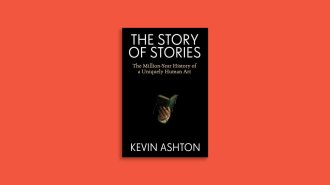2011 Science News of the Year: Science & Society

Following earthquake and tsunami, radiation is Japan’s true aftershock
The worst earthquake in Japan’s recorded history — and, at magnitude 9.0, one of the most powerful ever recorded — didn’t end when the shaking did on March 11. Within hours, a meters-high tsunami swamped much of the coastline, including the Fukushima Daiichi nuclear power station, setting off the worst nuclear accident since the 1986 Chernobyl meltdown in Ukraine (SN: 4/9/11, p. 5).
Three reactors at the Fukushima plant exploded, releasing radioactivity carried by winds across Japan and then around the globe (SN Online: 3/19/11). Radiation physicists continue to argue about how much radioactive material, such as cesium-137, escaped, with independent assessments often coming in much higher than the Japanese government’s official numbers. In late November the Tokyo Electric Power Co., which operates the plant, announced that at the worst-hit reactor, Unit 1, fuel rods had probably melted completely during the accident and pooled in the concrete bottom of the containment vessel.
Workers continue to try to cool and stabilize the damaged reactors; it could be years before the cores can be opened up and disposed of. Meanwhile, villages around the plant remain evacuated and may be uninhabitable for decades. —Alexandra Witze
Weather unrest One in five major civil conflicts since 1950 may be linked to climate extremes associated with El Ni±os, a study finds (SN: 10/8/11, p. 16).
Rule by a few A handful of individuals can enslave an entire network, even if they aren’t highly connected themselves. Scientists have found a way to identify these individuals, which might lead to more secure power grids, marketing campaigns that spread like the plague and tricks for controlling a cell’s metabolic growth processes (SN: 6/4/11, p. 5). Other work uses 2007 data to diagram the relationships among more than 43,000 corporations, showing that a tightly connected core controls more than one-third of global wealth (SN: 9/24/11, p. 13).
Acid test fails Contrary to claims made by informants within the Sicilian Mafia, sulfuric acid won’t dissolve a corpse in minutes, research reveals (SN: 3/26/11, p. 16).
Linked up Integrating data from clinicians’ notes with protein and genetic information reveals connections between health problems as seemingly unrelated as migraines and hair loss, or glaucoma and a hunching back (SN: 10/8/11, p. 16).
Crop dents Farms around the planet produced 3.8 percent less corn and 5.5 percent less wheat than they could have between 1980 and 2008 because of rising temperatures, a new analysis estimates (SN: 6/4/11, p. 15).
Personnel stress Service and support personnel face considerable and often overlooked war stress (SN: 9/24/11, p. 9).
The data age The fraction of the world’s data stored digitally has skyrocketed from about 0.8 percent in 1986 to 94 percent in 2007, a study finds. By 2007, the same analysis reveals, video game consoles were doing 25 percent of the world’s computing, and cell phones were doing 6 percent (SN Online: 2/10/11).
Vanishing act Methane, the predominant hydrocarbon produced by the BP blowout in 2010, has all but vanished from Gulf of Mexico waters — presumably eaten up by marine bacteria. That hadn’t been expected for years (SN: 1/29/11, p. 11).
NIH gap Among minority scientists applying for U.S. National Institutes of Health research grants, blacks alone face a substantially lower likelihood of being successful than whites, a study finds (SN Online: 8/18/11).
Dirty deeds A network analysis of Enron e-mails reveals that electronic missives regarding dirty dealings tend to transpire through a sparse hub and spoke network, rather than a highly connected web (SN: 7/2/11, p. 9).
War air U.S. soldiers in Iraq must contend with air that’s laden with heavy metals and lung-ravaging particles (SN: 4/23/11, p. 15).
Double threat Amoebas appear to contaminate drinking-water systems around the world (SN: 2/26/11, p. 9).
Penguin harm Scientists may be causing long-term harm to penguins by tagging their flippers with metal ID bands (SN: 2/12/11, p. 10).
Bandwagon rewards Day traders who act in sync — no matter the stock, or whether they are buying or selling — make more money at the end of the day than their out-of-sync peers (SN Online: 3/14/11).







